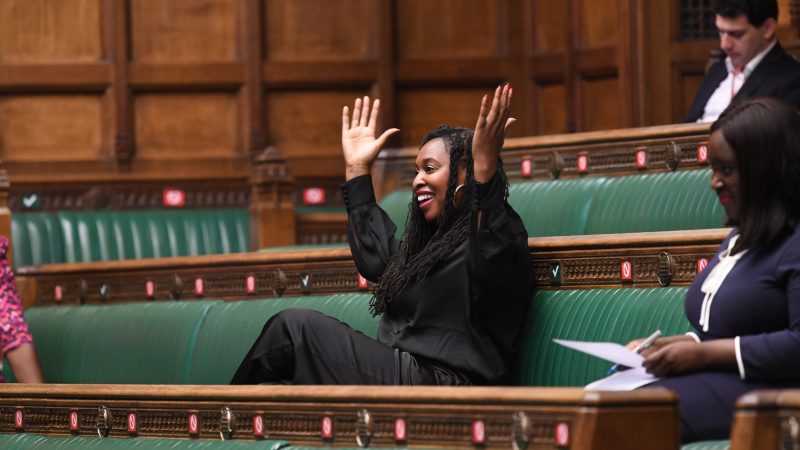
Black Labour MPs, including frontbenchers Chi Onwurah and Abena Oppong-Asare, have called on the government during a Commons debate to reform the curriculum to include more Black British history.
Labour parliamentarians used the debate on Black History Month this afternoon to call for more action on racism by the government, with several highlighting the higher Covid risk to BAME people and the need to “decolonise” the curriculum.
Streatham MP Bell Ribeiro-Addy also criticised the idea that opposing racism is unpatriotic, asking: “What more love can you have for your country than to make it the best place in the world for all people to live no matter the colour of their skin?”
Opening the debate for Labour, newly appointed shadow Treasury minister Oppong-Asare called on the government to do more to combat the effects of structural racism on Black British people.
Commenting on the racism still faced by Black people, she said: “I am sad to have to stand here and describe how discrimination has continued into the present. Its impact is still felt on so many lives.
“Black women are five times more likely to die in pregnancy. Black Caribbean children are three times more likely to be excluded from school. Black workers with degrees earn almost a quarter less than their counterparts…
“Why is it that year on year these statistics are read out in a debate or in the news and no action is taken? That it is still necessary in 2020 for young people to take to the streets to remind us that Black Lives Matter should shame us all.”
The Erith and Thamesfield MP concluded by calling for a race equality strategy from the government and a taskforce to diversify the curriculum. Her demands were echoed in a later speech by former deputy leadership candidate Dawn Butler.
Butler said: “At the moment, history is taught to make one group of people feel inferior and another group of people feel superior. And this has to stop. We need to look at history and we need to improve it… History needs to be decolonised.”
The Brent MP’s contribution sparked controversy on the opposite side of the chamber, with one Conservative MP making a point of order to ask why Butler was ignoring the plight of white slaves throughout history.
Butler replied: “Whenever there’s a discussion about Black history and the enslavement that lasted for decades that was built on the economy… there’s always this comparison where people try to compare one form of slavery to another.
“Especially during Black History Month, it would be progress if someone could just acknowledge the inhumanity that happened. That they could acknowledge the systemic racism that not only existed then but has a lasting legacy now.”
Former shadow immigration minister Ribeiro-Addy reiterated the calls to reform the curriculum and said those who don’t think it’s necessary “have to acknowledge how damaging it is not to see yourself reflected in your history”.
The Streatham MP said: “This debate is extremely timely because we found recently no subject has received more signatories for parliamentary petitions than that to see Black history taught as part of our history…
“I find myself a little suspicious because I also didn’t learn about the miners’ strike, the poll tax riots or the achievements of trade unions in school. Decolonising our education is every bit about class as it is about race.”
Ribeiro-Addy concluded: “When I challenge racism in my country, I don’t want anyone telling me I don’t love my country and I should go back to somewhere else. Because what more love can you have for your country than to make it the best place in the world for all people to live no matter the colour of their skin?”
Shadow minister Chi Onwurah told the Commons that as a child she never learned about the country’s Black history and said she “would have been hard put to name a dozen famous Black people outside music and sport”.
She added: “That is why Black History Month matters… My own achievement of being Newcastle’s first Black MP is put into context – I am not an outlier but standing on the shoulders of the many who go before me in our shared past.”
Labour leader Keir Starmer declared his support for changing the curriculum ahead of Black History Month, saying that Black history “should not be just one month – it should be a proper part of the curriculum”.
Onwurah also called on government ministers in the chamber to verify reports that eight times as many Black women were being hospitalised in the city of Newcastle as a result of coronavirus than white women.
Treasury minister Kemi Badenoch, who was representing the government in the Commons, told Onwurah that the concerns would be answered during a parliamentary statement she plans to deliver on Thursday.
Studies have shown that coronavirus is having a disproportionate impact on the Black community. In one report from the first wave of the pandemic, Black people were found to be almost twice as likely to die from Covid than white people.
Shadow minister Tulip Siddiq stressed during the debate the importance of remembering intersectionality in any approach to racism after Tory MP Bim Afolami spoke of his pride at attending elite private school Eton College.
Alluding to their shared middle-class upbringing, Siddiq asked: “Is racism not about intersectionality? Is it not true that we came from different backgrounds, and had different advantages, and that it’s just not the same for everyone?”
A 2016 report by the Equality and Human Rights Commission found that BAME people were more likely to live in poverty than their white counterparts and often face higher unemployment rates and live in worse accommodation.




More from LabourList
Nudification apps facilitate digital sexual assault – and they should be banned
Diane Abbott suspended from Labour after defending racism comments
Labour campaign groups join forces to call for reinstatement of MPs